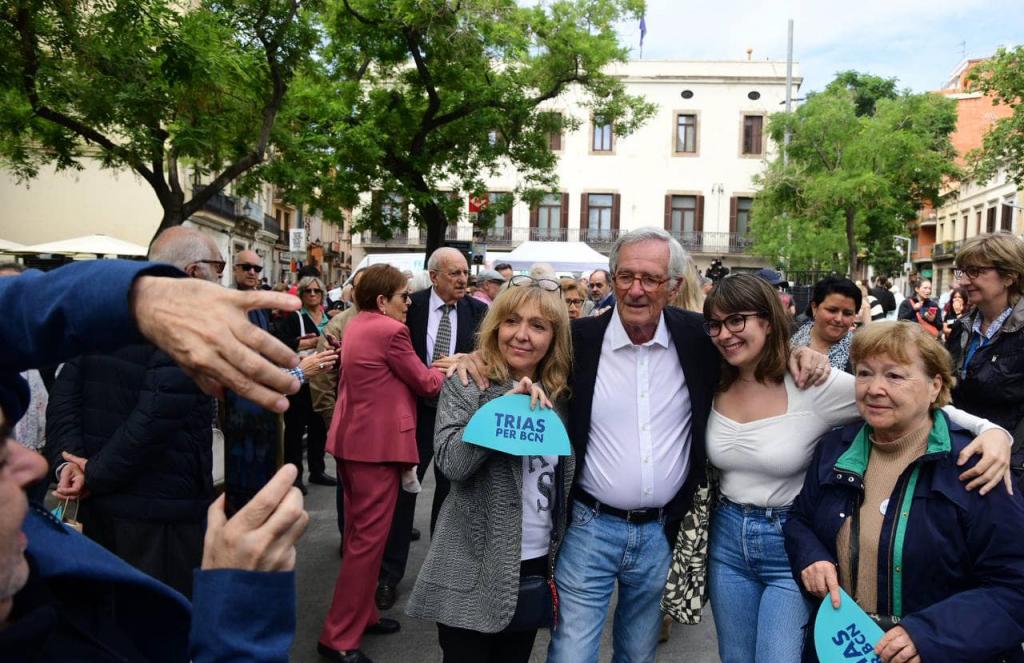Thessaloniki gets ready for its metro launch in November
The underground rapid transit lines have been under construction for almost two decades due to various project delays
 TheMayor.EU logo
TheMayor.EU logo 
Xavier Trias (in the centre) is set to return to the mayoral seat of Barcelona, 8 years later, Source: Xavier Trias Facebook
The results are also seen as a litmus test for the upcoming national vote later this year
Yesterday, 28 May, twelve of Spain’s 17 autonomous regions held legislative elections, and voting also took place in the country’s main cities. This morning's overall results show that the right-wing conservative Popular Party (PP) has swooped in and outperformed its main rival – the PSOE socialists, who are currently in charge of the national government.
In essence, this means that the largest cities of Spain will now all have blue mayors – the colour of the PP party. In some cases, this is a reaffirmation of their positions, in others it signifies unseating PSOE mayors.
The same goes for some of the autonomous regions (called comunidades autonomas in Spanish). The Conservatives are wrestling control of the Valencian region, La Rioja, Aragon, Navarre, Cantabria and the Balearics from their political rivals while retaining strongholds like the Madrid and Murcia regions.
Analysts, however, predict that in order to form governments in some of these regions, PP will have to rely on collaboration with the far-right Vox party, as no other party is likely to support the Conservatives.
The fact that many of the regions and the main cities have turned conservative doesn’t bode too well for PSOE leader and Primer Minister Pedro Sanchez. The PM called for snap elections to be held in July, ahead of the initial autumn schedule. The results seem to show that there is a fatigue with socialist-led policies.
The nation’s capital, Madrid, as well as Zaragoza will be retained as PP-strongholds. However, the notable shift is that Barcelona, Valencia and Seville will also have right-wing mayors.
In the Catalan capital, Xavier Trias, who was already a mayor of the city in the period 2011-2015, is set to return to the head seat in City Hall.
In Valencia, it looks like a farewell to current incumbent Joan Ribó, also in favour of PP´s María José Català, who elated by the results, declared that her city “aspires to be Spain’s second city”.
Likewise, Seville, which was firmly in the hands of PSOE since 2015 has turned the other way, with José Luis Sanz looking to be confirmed as the new mayor. This will mean that Andalusia will now have its regional government and its largest city both under the control of the conservatives.
The almost 8,100 Spanish town halls in which municipal elections were held this Sunday will be constituted and will elect a mayor on 17 June, once the area electoral boards declare the more than 67,000 people who have been elected.
That is done to give an opportunity for finalizing the results and presenting appeals to the courts. The regional parliaments will hold their first sessions between 13 and 16 June.

The underground rapid transit lines have been under construction for almost two decades due to various project delays

Now you can get your wine in Talence by paying directly in Bitcoin

That’s because the state has to spend money on updating the railway infrastructure rather than subsidizing the cost of the popular pass

Rethinking renewable energy sources for the urban landscape

The examples, compiled by Beyond Fossil Fuels, can inform and inspire communities and entrepreneurs that still feel trepidation at the prospect of energy transition

Now you can get your wine in Talence by paying directly in Bitcoin

The 10th European Conference on Sustainable Cities and Towns (ESCT) sets the stage for stronger cooperation between the EU, national and local level to fast track Europe's transition to climate neutrality.

At least, that’s the promise made by the mayor of Paris, Anne Hidalgo

The underground rapid transit lines have been under construction for almost two decades due to various project delays

At least, that’s the promise made by the mayor of Paris, Anne Hidalgo

Hostal de Pinós is located in the geographical centre of the autonomous region

Despite its church-y name, the district has long been known as the hangout spot for the artsy crowds

Urban dwellers across the EU are having a say in making their surroundings friendlier to people and the environment.

Forests in the EU can help green the European construction industry and bolster a continent-wide push for architectural improvements.

Apply by 10 November and do your part for the transformation of European public spaces

An interview with the Mayor of a Polish city that seeks to reinvent itself

An interview with the newly elected ICLEI President and Mayor of Malmö

A conversation with the Mayor of Lisbon about the spirit and dimensions of innovation present in the Portuguese capital














